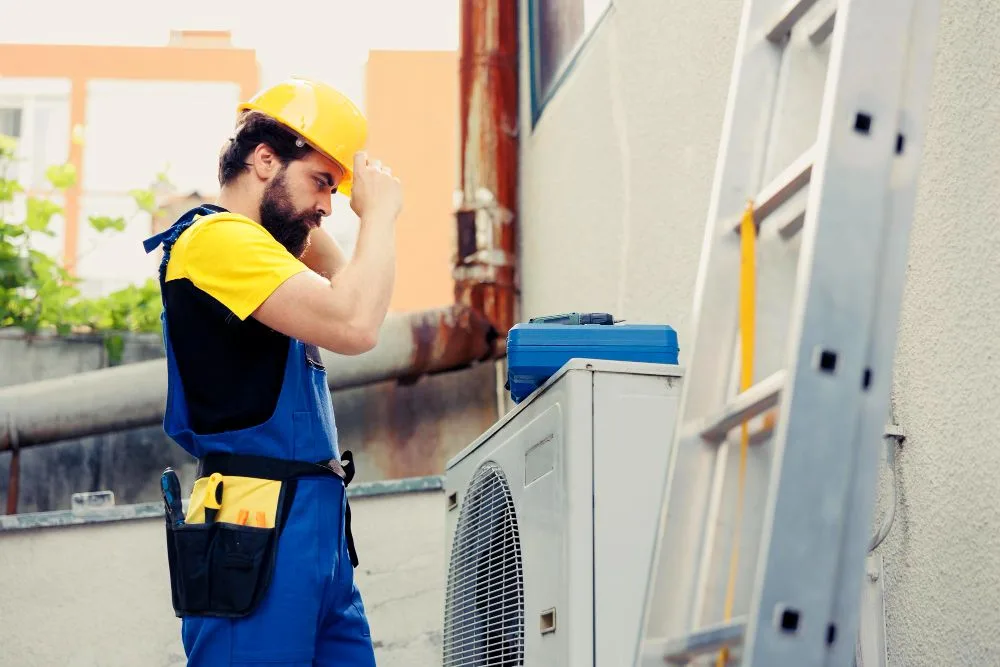As temperatures rise, securing your air conditioning system in top shape becomes crucial for a comfortable and cost-effective summer. Routine maintenance plays a pivotal part in keeping your AC unit running smoothly. From enhancing energy efficiency to prolonging its lifespan, a seasonal AC tune-up offers numerous benefits.
This guide provides practical insights into why, when, and how to conduct these tune-ups effectively. Learn about the advantages, preparation steps, what to expect during maintenance, and additional tips to keep your AC system performing optimally when the heat is on.
What is a Seasonal AC Tune-up?
A seasonal AC tune-up is routine maintenance performed on an air conditioning system before peak usage periods, like summer. It involves inspecting, cleaning, and adjusting various components, such as filters, coils, coolant levels, and electrical connections. This proactive service aims to optimize system performance, prevent breakdowns, enhance energy efficiency, and extend the unit’s lifespan. Regular tune-ups ensure your AC operates reliably and efficiently when you need it most.
Benefits of a Seasonal AC Tune-up
Performing a seasonal AC tune-up offers various benefits that contribute to the overall efficiency, longevity, and performance of your air conditioning system. Here are the five key advantages:
- Enhanced Energy Efficiency
Regular maintenance confirms that your AC operates at peak efficiency. Cleaning or replacing filters, inspecting and cleaning coils, and optimizing components reduce energy consumption. An efficiently running system consumes less energy, leading to lower utility bills.
- Improved System Performance
Routine tune-ups involve inspecting and calibrating various components, such as thermostats, refrigerant levels, and electrical connections. This ensures that the system functions optimally, providing constant and reliable cooling throughout your home or space.
- Prolong System Lifespan
Routine maintenance aids in the early detection and resolution of minor issues, averting their progression into major problems. This proactive strategy mitigates premature deterioration, minimizes breakdown risks, and prolongs the life expectancy of your AC unit.
- Prevents Costly Repairs
By addressing minor issues early on, seasonal tune-ups can prevent larger, more expensive problems in the future. This saves you from unexpected repair costs and potential system failures, especially during peak usage seasons.
- Ensures Indoor Air Quality
Clean filters and properly maintained components contribute to better indoor air quality. Regular maintenance removes dust, debris, and allergens from the system, preventing them from circulating in your living space and improving air circulation.
How Often Should You Have a Seasonal AC Tune-Up?
For optimal AC performance, aim for an annual tune-up. For older units, consider twice-yearly maintenance to ensure reliability through hot seasons. Older systems benefit from more attention; increasing tune-ups can help extend their lifespan and maintain efficiency during warmer months. Regular servicing, especially for aging units, minimizes breakdown risks and ensures peak performance for a comfortable indoor environment.
What Can You Do to Prepare for Your Seasonal AC Tune-Up?
Preparing for a seasonal AC tune-up involves several steps to ensure a smooth and effective maintenance process. Here’s a checklist to guide you in getting ready:
- Schedule an Appointment
Contact a reputable HVAC technician or company to schedule a professional AC tune-up. It’s advisable to do this before the start of the cooling season or when your system requires maintenance.
- Gather Necessary Information
Have details about your AC system ready, including the make and model, any previous maintenance or repairs, warranty information, and any specific issues or concerns you’ve noticed with the system.
- Clear Surrounding Area
Ensure the area around the indoor and outdoor AC units is clear and accessible. Remove any obstacles, debris, or items that may obstruct the technician’s access to the system.
- Check Filters
Check the air filters in your HVAC system. If they’re dirty or clogged, consider replacing them before the technician arrives. Clean filters help improve airflow and system efficiency.
- Make a Note of Any Issues
If you’ve noticed any irregularities or problems with your AC system, jot down the details. This information can be helpful for the technician to diagnose and address specific issues during the tune-up.
- Clear Your Schedule
Set aside time for the technician’s visit. AC tune-ups may take a couple of hours, depending on the system’s condition and any required maintenance tasks.
- Prepare Questions
Consider any questions or concerns about your AC system. This can include queries about energy efficiency, recommended maintenance practices, or tips for optimizing the system’s performance.
What to Expect During Your Seasonal AC Tune-up

During a seasonal AC tune-up performed by a professional HVAC technician, you can expect a thorough inspection and maintenance of your air conditioning system. Here’s what typically happens during a seasonal AC tune-up:
- System Inspection
The technician will conduct a comprehensive inspection of both the indoor and outdoor components of your AC system. This includes examining the condenser unit, evaporator coils, blower components, electrical connections, thermostat, and other essential parts.
- Cleaning and Maintenance
The technician will clean various components of the system. This may comprise cleaning or replacing air filters, clearing debris from the condenser unit, cleaning the evaporator coils, and removing any obstructions from the system that may hinder its performance.
- Refrigerant Check
They’ll check the refrigerant levels to ensure they are at the proper levels. If refrigerant levels are low, it might indicate a leak, which the technician will investigate further.
- Inspecting Electrical Components
The technician will inspect electrical connections, controls, capacitors, and other electrical components for any signs of wear, damage, or loose connections that could affect the system’s performance.
- Lubrication
Lubrication of moving parts such as motors and bearings might be done to reduce friction and ensure smoother operation.
- Checking Ductwork
They may inspect visible parts of the ductwork for leaks, blockages, or damage that could impact airflow or energy efficiency.
- Testing System Performance
The technician will test the system’s operation to ensure it’s working efficiently. This might include running a cycle to check the cooling output, checking the thermostat’s accuracy, and ensuring proper airflow.
Additional Tips for Keeping Your AC System Running Smoothly
Keeping your AC system running smoothly involves ongoing maintenance and care. Here are some additional tips to help maintain your air conditioning system and ensure optimal performance:
- Regularly Change or Clean Filters
Follow manufacturer recommendations and change or clean your air filters regularly. Clogged filters restrict airflow, reduce efficiency, and can strain your system, leading to raised energy consumption and potential damage.
- Keep Outdoor Unit Clean
Regularly clean the outdoor condenser unit. Remove debris, leaves, dirt, and vegetation around the unit to ensure proper airflow. Gently hose off the coils and fins to remove dirt buildup that can impede performance.
- Maintain Clear Vents and Registers
Ensure that indoor vents and registers are not blocked by furniture, rugs, or other obstructions. Proper airflow is critical for the efficient operation of your AC system.
- Check Thermostat Settings
Set your thermostat to an efficient temperature, and think about using programmable thermostats to adjust temperatures based on your schedule. This can help save energy when you’re away from home.
- Schedule Professional Maintenance
Arrange for annual or bi-annual professional maintenance by a certified HVAC technician. Regular inspections and tune-ups can identify and address issues before they become major problems, improving system efficiency and lifespan.
Seasonal AC Tune-Up FAQs
What should you do before turning on the AC in summer?
Before turning on the AC in summer, clean or replace air filters, check the outdoor unit for debris or obstructions, ensure vents are unblocked, and inspect thermostat settings for proper operation. Schedule professional maintenance if necessary to ensure optimal performance and efficiency.
How do I take care of my AC in the summer?
To care for your AC in summer, prioritize regular filter changes, keep the area around the outdoor unit clear, ensure unobstructed vents, schedule professional maintenance, and adjust thermostat settings for efficient cooling and comfort in hot weather.
What is the normal AC setting for summer?
The U.S. Department of Energy suggests setting the AC to 78°F in summer for cost-effective cooling during the day. This temperature is considered the ideal and most efficient setting for maintaining comfort while minimizing energy consumption. Following this guideline helps balance comfort and energy savings during warmer months.
How do I start my AC in a new season?
To start the AC in a new season, switch on the thermostat, then run the system in fan mode initially to clear dust for 10 minutes. Next, switch to cool mode. Check vents to ensure cold air is flowing. This process helps clear dust and ensures proper functionality when starting the AC after a season.
Conclusion
It is clear that prioritizing a seasonal AC tune-up reaps numerous benefits, ensuring efficient performance and longevity. Regular maintenance, preparation steps, thorough inspections, and ongoing care are pivotal for optimal functioning. By adopting these practices and seeking professional assistance, your air conditioning system stays reliable, efficient, and ready for any seasonal challenge.
At Tropic-Air Conditioning Inc., we prioritize your comfort and offer comprehensive AC maintenance services. Ensure your system runs efficiently – contact us now to schedule your seasonal tune-up for reliable, cool comfort all summer long!




